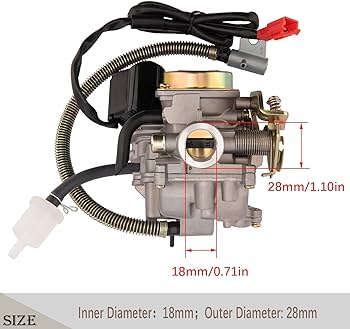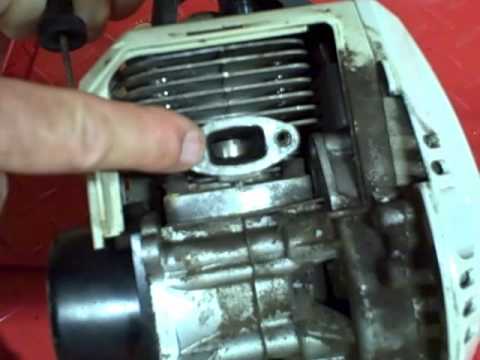Yes, a muffler can get clogged, leading to reduced engine performance and excessive noise. A clogged muffler can result from a buildup of debris, corrosion, or internal damage, and it can impact the overall efficiency of the exhaust system.
When the exhaust flow is restricted, it can lead to increased back pressure, causing strain on the engine and decreased fuel efficiency. Additionally, a clogged muffler can result in the emission of harmful pollutants, impacting the environment. Regular maintenance and inspection of the exhaust system can help prevent and address muffler clogging, ensuring optimal vehicle performance and environmental responsibility.
It’s important to address any muffler issues promptly to avoid costly repairs and to maintain a smooth-running vehicle.
Contents
Recognizing A Clogged Muffler
When it comes to vehicle performance, a clogged muffler can be a major inconvenience, potentially leading to a host of issues. From unusual noises from the exhaust to reduced fuel efficiency and power loss, recognizing the signs of a clogged muffler is crucial in maintaining your vehicle’s health and functionality. By addressing these warning signs promptly, you can avoid more extensive and costly repairs down the line.
Common Signs That Hint At A Clog
Several common signs point to a clogged muffler. These can include excessive smoke coming from the exhaust, a noticeable reduction in engine power, and an overall sluggish driving experience. When recognizing these signs, it’s essential to address the issue promptly to prevent more severe damage to your vehicle.
Unusual Noises From The Exhaust
One of the most telling signs of a clogged muffler is the presence of unusual noises coming from the exhaust. These may include a deep rumbling sound or a pronounced hissing or popping noise. These abnormal sounds can often indicate a blockage in the muffler or exhaust system, which should be diagnosed and resolved by a qualified mechanic.
Reduced Fuel Efficiency
A clogged muffler can also lead to reduced fuel efficiency, as the engine struggles to expel exhaust gases efficiently. If you notice a significant decrease in your vehicle’s miles per gallon, it may be a sign of a clogged muffler that needs attention.
Power Loss And Acceleration Issues
Another indication of a clogged muffler is power loss and acceleration issues. If your vehicle feels sluggish when accelerating or struggles to maintain speed, it could be a result of a restricted exhaust system, potentially stemming from a clogged muffler.
Inspecting For Muffler Blockages
Conducting regular inspections for muffler blockages is crucial for maintaining the functionality of your vehicle’s exhaust system. Blockages can significantly hinder the performance of the muffler, leading to decreased fuel efficiency and potential engine damage. In this post, we’ll explore the essential steps for inspecting muffler blockages to ensure optimal vehicle performance and safety.
Visual Examination For Rust And Debris
Performing a visual inspection of the muffler can provide valuable insights into potential blockages. Look for signs of rust, corrosion, or debris accumulation on the exterior of the muffler. Rust and debris can indicate the presence of blockages due to the buildup of exhaust particles over time. Examine the muffler thoroughly, paying close attention to any irregularities that may signal a blockage.
Exhaust Flow Tests For Confirmation
To confirm the presence of blockages, conduct exhaust flow tests on the vehicle. This can be achieved by using specialized equipment to measure the efficiency of exhaust flow. An obstructed muffler will result in reduced exhaust flow, leading to backpressure that can negatively impact the engine’s performance. Examining exhaust flow is an effective method for determining if a blockage is impeding the muffler.
Importance Of Addressing Early Signs
Addressing early signs of muffler blockages is crucial for preventing potential damages to the engine and ensuring optimal vehicle performance. Promptly addressing blockages can help maintain fuel efficiency and prolong the lifespan of the exhaust system. By recognizing and addressing early signs of blockages, vehicle owners can mitigate potential issues and avoid costly repairs down the line.
Factors Leading To Muffler Clogs
Accumulation Of Soot And Carbon Deposits
Over time, the exhaust system in your vehicle can become clogged due to the accumulation of soot and carbon deposits. As the byproducts of combustion build up, they can restrict the flow of exhaust gases, leading to reduced engine performance and increased fuel consumption.
Effects Of Internal Corrosion And Rust
Internal corrosion and rust within the muffler can also contribute to clogging. Exposure to moisture and road salt can cause the metal components of the muffler to deteriorate, creating obstructions that impede exhaust flow. In severe cases, this corrosion can lead to holes in the muffler, exacerbating the issue.
Foreign Objects Causing Obstruction
In some instances, foreign objects such as debris or small particles can enter the exhaust system and cause obstructions in the muffler. This can occur as a result of damaged catalytic converters or resonators, leading to a blockage that impedes the smooth flow of exhaust gases.
Preventive Measures For A Healthy Muffler
The muffler is an essential component of your vehicle’s exhaust system, responsible for reducing noise and directing harmful emissions away from the vehicle. However, it is susceptible to clogging due to the build-up of debris and residue, which can negatively impact its functionality. To ensure the longevity and optimum performance of your muffler, implementing preventive measures is crucial. By incorporating regular inspections and cleaning, adopting driving habits that reduce residue build-up, and utilizing high-quality fuel and additives, you can maintain a healthy muffler and avoid potential issues.
Regular Inspections And Cleaning
Regular inspections of your muffler are essential to identify any signs of clogging or damage. Inspect the muffler for any visible deposits, rust, or corrosion, and address them promptly. Additionally, cleaning the muffler, particularly the exhaust pipe and the surrounding components, can help prevent clogging by removing accumulated debris and residue. Consider using specialized cleaning products and tools to ensure thorough maintenance.
Driving Habits That Reduce Residue Build-up
Opting for smooth and consistent driving habits can significantly reduce the build-up of residue in your muffler. Additionally, minimizing idle time and avoiding abrupt acceleration and deceleration can contribute to a healthier exhaust system. By reducing the accumulation of soot and carbon deposits, you can prolong the lifespan of your muffler and maintain its efficiency.
High-quality Fuel And Additives Use
Using high-quality fuel and additives can aid in preventing clogging and maintaining the overall health of your muffler. Ensure that you source fuel from reputable stations, as low-quality fuel may contain impurities that can lead to residue accumulation. Additionally, consider using fuel additives formulated to clean and protect the exhaust system, helping to minimize the risk of clogging and ensuring optimal performance.
Choosing The Right Muffler Repair
If you suspect that your muffler is clogged, choosing the right repair option is crucial to getting your vehicle back on the road. Understanding the difference between DIY and professional repair scenarios as well as selecting a qualified automotive technician can make all the difference in the outcome of your muffler repair.
Diy Vs. Professional Repair Scenarios
When it comes to dealing with a clogged muffler, there are both DIY and professional repair scenarios to consider. While DIY repairs can be an option for some car owners, it’s important to evaluate the extent of the clog and your own mechanical skills. In cases of minor clogging, a DIY approach using a muffler cleaner or simple unclogging tools may be sufficient. However, for more serious clogs or if you’re uncertain about performing the repair, professional assistance is advisable to avoid potentially causing further damage to the muffler or exhaust system.
Selecting A Qualified Automotive Technician
Choosing the right automotive technician is crucial to ensuring a successful muffler repair. Look for a qualified technician with experience in muffler repairs and a good reputation in the automotive industry. When selecting an automotive technician, consider factors such as certifications, customer reviews, and the technician’s ability to diagnose and address muffler issues effectively.
What To Expect During A Professional Clean-up
- The technician will first assess the extent of the clog and identify any underlying issues with the muffler or exhaust system.
- Using specialized equipment and techniques, the technician will proceed to clean the muffler and remove any obstructions or built-up debris.
- After the clean-up process, the technician will conduct a thorough inspection to ensure that the muffler is functioning optimally before reassembling the exhaust system.
By following these steps, a professional clean-up can effectively address a clogged muffler and restore the proper functioning of your vehicle’s exhaust system.
Credit: www.southwestairsports.com
Frequently Asked Questions On Can A Muffler Get Clogged
Can A Clogged Muffler Affect Engine Performance?
Yes, a clogged muffler can restrict exhaust flow, leading to reduced engine efficiency and power. A clogged muffler can also cause backpressure, increasing engine stress and potentially leading to damage over time. Regular maintenance and inspection can prevent this issue.
What Are The Common Signs Of A Clogged Muffler?
Common signs of a clogged muffler include reduced engine power, increased exhaust noise, decreased fuel efficiency, and visible exhaust smoke. Additionally, a vibrating gas pedal or a noticeable decrease in acceleration may indicate a clogged muffler. Any of these symptoms should prompt a professional inspection.
How Can I Prevent A Muffler From Getting Clogged?
Regular maintenance is key to preventing a clogged muffler. This includes keeping the exhaust system clean, replacing the muffler when necessary, and addressing any issues that could lead to debris buildup. It’s also important to use high-quality fuel to minimize carbon deposits in the exhaust system.
Conclusion
A clogged muffler can cause various issues, affecting your vehicle’s performance. Regular maintenance and prompt repairs are essential to prevent muffler clogging. By staying vigilant and addressing any signs of a clogged muffler, you can ensure that your vehicle operates smoothly and efficiently.
Don’t overlook the importance of proper muffler care for a well-functioning vehicle.


